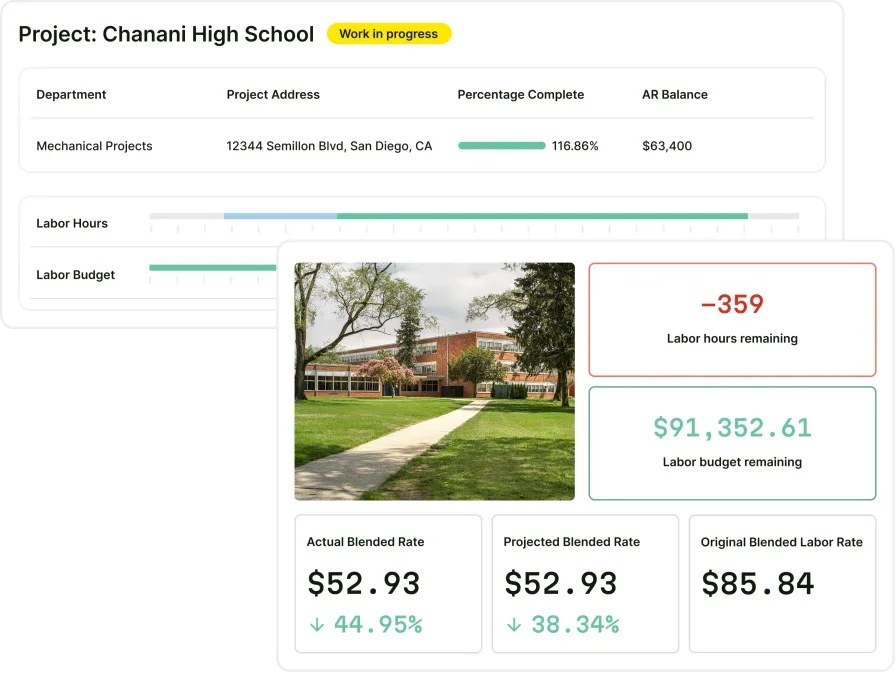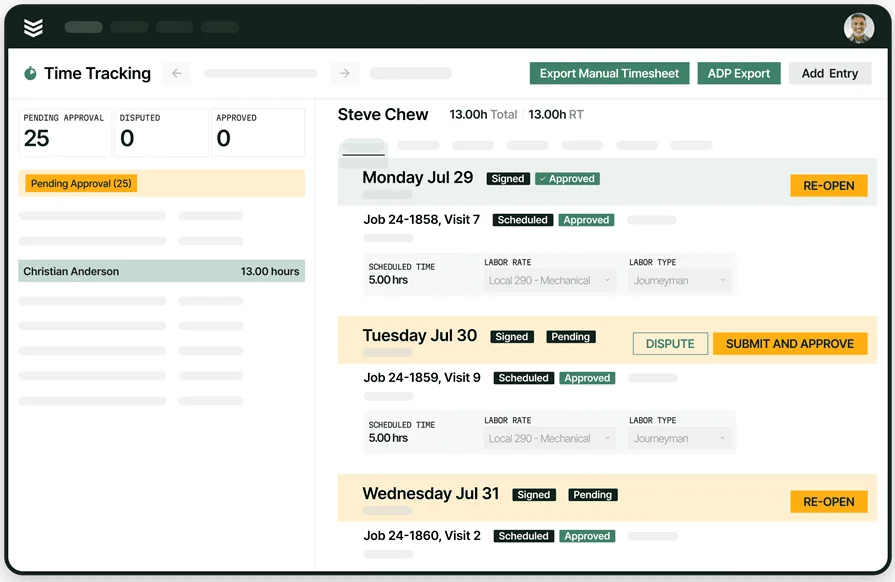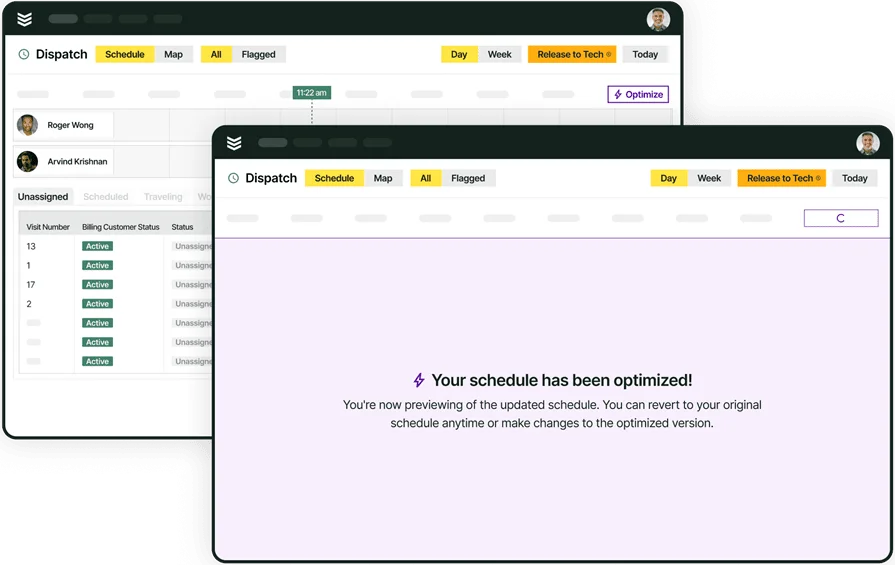You want your field techs to work hard for your company, but you can’t be exactly where they are all the time. Unfortunately, this opens up the possibility that they’ll show up for work late (or not at all), not use their time efficiently, or even defraud you through stealing or unjustified expenses.
Using field service management technology to track your techs when they’re on the job helps solve these accountability issues and makes your operations more efficient. In this article, we’ll cover the most important topics related to how to track field employees, including:
- 9 essentials to identify when tracking employees in the field
- 6 best practices for how to track field employees for greater operational efficiency
- 7 field employee tracking apps, software, & tools to use for greater efficiency
- 4 common mistakes businesses make when tracking employees in the field
- 5 important field service tracking FAQs and things to consider
We’ll start by outlining some basic things you should keep track of regarding your techs while they’re in the field.
9 essentials to identify when tracking employees in the field
So what information is most useful when tracking employees in the field? Here are 9 elements you want to keep an eye on while your employees are traveling to and from job sites.
- Location – You should always know where your employees are so you can confirm when they’re at a job site doing work, and quickly provide them with help if they encounter a problem.
- Work hours – You should track how long techs are actually working, both to pay them fairly and to assess their productivity. This should include measuring the length of scheduled breaks, and any overtime your techs put in.
- Task progress – You should have a way of tracking job or project milestones so you know how long each one takes to complete. This lets you determine how efficient your techs and procedures are, which improves your field service scheduling process.
- Inventory – It’s important to keep track of what equipment is brought to job sites, especially if techs don’t bring their own equipment. This helps to prevent the loss or theft of power tools, vehicles, and so on.
- Mileage – Tracking the time and distance it takes for techs to get from one job site to another helps you plan more effective field service routing and account for fuel expenses.
- Network access – Your techs’ mobile devices can contain sensitive company and customer information, including the credentials to access it. You should make sure that your techs are only using company-approved networks to connect to the Internet, limiting the risk of data loss or theft.
- App use – You should be aware of how employees are using other apps on their mobile devices during a workday, so you know when they are being unproductive. This is especially important for social media and other communication tools, where they may share company information (intentionally or not).
- Expenses – You want to keep tabs on how much your employees are spending while on the job, and what they’re spending it on, to check if it’s justifiable considering the work they’re doing.
- Offline status – There may be times when it’s difficult to track a tech with their mobile device. They may switch the device or its network connection off, they may be somewhere with poor or no network connectivity, or the device may run out of battery power. Ideally, you should have a way to track field service metrics & KPIs even when a tech is offline, and get a report on when, where, and why a tech couldn’t be reached when they were supposed to be on duty.
6 best practices for how to track field employees for greater operational efficiency
Now you know what to track in the field, but how would you actually go about tracking it? Here are 6 recommendations on using technology to remotely monitor and manage your techs effectively.
1. Use real-time GPS tracking to monitor resource locations
You can’t always rely on computer monitoring, video surveillance, or techs checking in with a mobile app to know where your techs are at any given time. Your techs may not always be using all the functionality and features of their mobile app that help with monitoring, or they may work in confined areas with poor network connectivity (especially in construction or mining).
So it’s best to use GPS trackers synced to their mobile phones or, ideally, attached to their clothing. That way, you can use GPS-enabled field service management software to keep tabs on them in real time when other tracking solutions aren’t working. It can also be worthwhile to put GPS trackers in or on certain equipment so you can trace it if it gets left at or stolen from a work site.
2. Use geofencing to help track job site attendance and work hours
Geofencing is a technique that uses GPS or radio frequency ID (RFID) technology to create a virtual boundary around an area, which tracks whenever somebody crosses it. Using this, you can tell when techs arrive at or leave a work site. This lets you know things like if your techs arrive at a job site on time (or at all), how long they stay on site, and whether they spend the right amount of time on break. This also helps prevent “buddy punching” fraud, where a tech signs in on behalf of another tech who isn’t actually at the job site.
3. Use SIM-based tracking as a backup way to find out where techs are
A 2021 report by Service Council indicates that 99% of field service techs use a mobile device for work (either their own or a company-issued one), so another way you can effectively monitor techs movements is with SIM-based tracking. This allows you to use cell towers combined with SIM card data in mobile phones to triangulate your techs’ locations. The best part of this method is you can have your techs use regular mobile phones – you don’t need them to use smart phones if it isn’t cost-effective.
4. Set up a firewall-protected, company-exclusive Internet network
Your techs need to be able to connect to the Internet to use a field service mobile app (among other apps) for work, but third-party networks are vulnerable to hackers. So create a dedicated network with additional login credentials that techs are required to use to access the Internet. This serves three main purposes:
- It keeps your techs from accessing third-party networks that may make their devices vulnerable to cyberattacks and other digital threats
- It allows you to monitor who accesses the network so you can keep unauthorized users out and guarantee that only your employees have access to your data
- It allows you to monitor your techs’ Internet use while they’re on the job so you can tell whether they’re using it productively or not
5. Provide your team with simple communication tools
Another effective way to track field employees is to keep communication lines open. Team collaboration apps – or field service management software that has team collaboration functions like instant messaging and voice/video calling let techs and back office staff stay in touch with each other. That way, everyone involved in a job gets timely, accurate information that they can act on quickly.
For enhanced security, have techs create dedicated work-only accounts for these communication tools. Make it clear that these accounts are to be used exclusively for work, and are not for personal use as they will be monitored.
6. Outfit vehicles with technology to track mileage and fuel consumption
If you manage a fleet of vehicles to help your techs get between job sites, those vehicles should have on-board tools (such as GPS) and sensors that allow you to track where they’re going, how far they’re going, and how much fuel they have left. This lets you optimize routes for getting from one job site to the next and determine if fuel expenses are reasonable.

Streamline job management
Track your fleet and manage crews in the field with an all-in-one FSM platform.
7 field employee tracking apps, software, & tools to use for greater efficiency
So which field tracking tools have the features you need to get the most out of your team? We’ve provided summaries of 7 popular options so you can choose the field employee tracking app that’s right for you.
1. BuildOps: Best for commercial field service contractors
BuildOps is specifically designed to tackle the challenges of managing commercial field service projects. It can track techs and equipment across multiple job sites, as a customer may own assets in several different locations.
How Tracking Field Employees Works on BuildOps: Real-time GPS tracking allows your dispatchers to see when your techs are available. Meanwhile, real-time updates on the mobile app let techs know when a job is assigned, canceled, or changed.
Field Service Tracking Standout Features:
- Techs immediately get an alert and all relevant information about a job as soon as it’s assigned
- Dispatchers can see scheduling conflicts, late jobs, and unassigned jobs to schedule more efficiently
- Techs can update their statuses to help dispatchers know when they’re available

Give BuildOps a Try
See how BuildOps helps teams manage techs more effectively in the field.
2. Buddy Punch: Best for work site attendance
Buddy Punch’s specialty is making clocking in and out of work accessible. It has multiple ways to log in, has optional GPS tracking you can turn on and off for individual employees, and many other scheduling & time tracking features.
How Tracking Field Employees Works on Buddy Punch: Techs can clock in and out of work sites through multiple methods, some of which work even without an Internet connection.
Field Service Tracking Standout Features:
- Clock in using username & password, QR code, facial recognition, 4-digit PIN, or text message on multiple platforms
- Dispatchers can choose whether or not to track individual tech locations through GPS
- Easy-to-use interface for techs to schedule time off
3. Hellotracks: Best for employee and vehicle location tracking
Hellotracks is designed for field service companies that use vehicles often. It has very accurate GPS tracking, along with features to optimize travel routes, scheduling, and dispatching.
How Tracking Field Employees Works on Hellotracks: Same-second GPS tracking allows you to see exactly where your techs are at a job site or en route by pinging their mobile devices every 20 seconds.
Field Service Tracking Standout Features:
- Easy to assign jobs to techs and give them optimized routes to job sites
- Custom geofencing only logs work hours while techs are at a job site or on an assigned route
- AI-powered scheduling and dispatching based on techs’ locations, skills, and availability
4. Timeero: Best for offline tracking
Timeero works best at job sites that don’t have very good Internet or mobile network signals. Timeero’s flexible geofencing capabilities make it easy for techs to clock in and out of work sites – and for dispatchers to track their locations – even if they can’t get a network connection.
How Tracking Field Employees Works on Timeero: Pick a job site to set a geofence around, set the geofence’s radius, and then automatically clock techs in or out when they enter or exit the geofence.
Field Service Tracking Standout Features:
- Techs can clock in and out even if they’re outside job site geofences to log hours in areas with poor network connectivity
- GPS-based activity log allows you to track a tech’s movement throughout a workday
- Segmented mileage tracking for techs who travel between multiple job sites in a day
5. Hubstaff: Best for productivity measurement
Hubstaff’s strength lies in its features for making sure your techs are working productively in the field. It can track the apps and websites your employees use while on the job, including taking screenshots at set intervals. It also provides alerts if an employee is idling, late, or a no-show, making sure someone can pick up the slack.
How Tracking Field Employees Works on Hubstaff: GPS and geofences track tech movement, preventing them from clocking in or out if they aren’t actually at a job site.
Field Service Tracking Standout Features:
- Extensive features for measuring and reporting employee activity
- Prompts during idle periods for techs to confirm they’re still working or adjust their hours
- Website and app use tracking capabilities, including automated screenshots
6. Workyard: Best for residential construction
Workyard is primarily designed for construction contractors. Its strengths lie in its ability to track techs at a job site or vehicles in transit. It also has several tools to document and analyze job-related information, making scheduling, dispatching, and overall project planning easier.
How Tracking Field Employees Works on Workyard: Precise GPS and geofencing keeps track of employees, including sending automated clock-in and clock-out reminders.
Field Service Tracking Standout Features:
- Automatically tracks travel mileage for accurate expense management
- Powerful job documentation capabilities for tracking project progress and costs
- AI timesheet analysis to catch inconsistencies like early clock-outs, unapproved overtime, and time theft
7. Jibble: Best for teams on a budget
Jibble is one of the most affordable field service tracking apps, as it includes a free plan with basic features. It has geofencing to automatically control GPS tracking on techs clocking in or out, and facial recognition to check if it’s actually a specific tech clocking in or out. It also has some offline tracking features.
How Tracking Field Employees Works on Jibble: Set up geofences around a job site and automatically see where techs are via GPS when they clock in or out.
Field Service Tracking Standout Features:
- Facial recognition on clock-in prevents buddy punching fraud
- Automated timesheet creation when employees submit hours
- Offline tracking features sync data when techs reestablish an Internet connection.
Expert Tip
Also be sure to read our guide to the best field service apps for even more apps that can boost your field service team’s productivity, and to learn about the features that help them do it.
4 common mistakes businesses make when tracking employees in the field
While field service tracking can definitely be useful, it can also be counterproductive if you don’t do it right. Here are four critical blunders to avoid.
1. Not getting consent
Laws and other regulations often require you to get explicit consent from your field techs before you can track their activities. If you don’t, you can get in trouble for tracking them. Make sure they provide written consent as part of their contracts.
2. Not establishing clear policies
It’s tough to get your techs to consent to being tracked if they don’t know what’s being tracked about them and why. Clearly outline the purpose and goals of tracking your techs in the field, making sure to highlight the ways it benefits them: paying them fairly, getting them help quickly if they’re in trouble, rewarding great performance, and protecting them with evidence in case of an audit.
3. Not sufficiently training techs
Tracking tools don’t work so well if your techs don’t know how to use them properly. Make sure your techs know how to set up and use tracking functions on their mobile devices and equipment, and in-field communication tools. You don’t want inaccurate data causing accounting errors and faulty analysis or, in a worst-case scenario, not being able to locate or contact one of your employees in an emergency.
4.Tracking too many things
You should have a legitimate reason for anything you track and be able to communicate that reason to your techs so they can decide whether or not to consent to the tracking. You should also make sure tracking something conforms to privacy (and other) regulations. Tracking things you aren’t legally allowed to, or without your employees’ knowledge or permission, can get you in big trouble.
In addition, tracking extra data points that don’t directly allow you to measure your team’s in-field performance is a waste of time and effort. Stick to the stats that matter.
5 important field service tracking FAQs and things to consider
Here are five other things you may want to know about tracking field service employees.
1. Why is it important to track field employees?
Tracking field employees is important for a number of reasons, but these are the main ones:
- Keep your back office staff in the loop – Your admin staff can get a sense of how projects are progressing in the field, as they usually aren’t directly at job sites to monitor this (while your field techs are).
- Hold your field employees accountable – Tracking them helps your admin staff monitor where they are, where they’re going (and how they’re getting there), how they’re using their time, and how much they’re spending on things such as food, fuel, or equipment. Based on this, you can recognize and reward techs who are excelling, help techs who are struggling, or make general policy changes towards improving your workforce’s efficiency.
- Keep your field employees safe -- By knowing where your field techs are, your dispatchers can quickly direct additional techs – or even emergency services, if needed – to their locations to help with any issues.
2. What are some other benefits of tracking field service employees?
Some other ways you benefit from tracking your field techs include:
- Transparency – Build trust with your techs by accurately measuring how much time they spend working on jobs, and paying them what they’re owed.
- Compliance – Accurately documenting things like when your employees work, when they’re on break, and when they’re working overtime provides proof that you’re following labor regulations.
- Productivity – By knowing where your field work is going smoothly and where you’re facing problems, you can deploy your resources in ways that most efficiently get jobs done.
- Resource saving – Automating employee tracking with software cuts down on manual administrative work that’s time-consuming and prone to human error.
3. How do data privacy laws present challenges to field service tracking?
Some kinds of information you may track about your field employees – including their names, contact details, work schedules, physical locations, and performance metrics – can be considered personal or otherwise sensitive under data protection laws, such as the California Consumer Privacy Act (CCPA).
Failing to keep this data secure or collecting data you aren’t supposed to in the first place can cause work disruptions, loss of employee trust, and even regulatory fines or other legal penalties. So there are a number of things you should do to limit the risks of data privacy breaches. These include:
- Understand the data protection rules you have to follow based on where your company is located and stores its data
- Do your due diligence on the data security policies of field service management software offered by third parties
- Only collect data necessary for your operations, and get employee consent regarding how and why it’s tracked
- Train employees on what data needs to be protected and why, along with how to properly secure and handle it
- Secure data in transit and at rest with strong passwords, encryption protocols, and remote wipe capabilities
- Control internal access to data with role-based permissions and strong authentication
- Have a detailed plan for how to report and manage potential data breaches and other security incidents
- Back up data regularly, and test if you can successfully recover it
- Regularly conduct audits and tests to see if your data privacy system is working effectively
4. How much do field service tracking tools cost, and are they worth the price?
Field service management software that includes field tracking tools vary in price, depending on what other functions they have. They are usually priced on a per-user-per-month basis – more basic packages can cost $20-$30/user/month and up, while more feature-rich systems can cost $150-$200/user/month or more.
As to whether these tools are worth it: absolutely. You can’t always be physically with your techs to see what they’re doing, so you need a way to monitor them somehow. Otherwise, you risk them not showing up for jobs on time (or at all), being unproductive at work, racking up excessive expenses, or even stealing equipment. And that’s going to cost you far more than it will to make sure they’re doing what they’re supposed to in the first place.
Field service tracking tools help you guarantee that your techs are at work on time and productive while they’re there. That helps your scheduling and dispatching, too, as jobs are done and techs are available when you expect them to be.
5. Which industries most commonly use field service tracking?
Pretty much any industry that uses field techs also uses some way of tracking them. These most common industries to use field service tracking are:
BuildOps has the features you need to keep tabs on your workforce as they tackle commercial field service projects. Real-time dispatch updates and notifications help your techs be where they need to be, when they need to be there. And with all the project notes they need in front of them – along with AI-assisted notetaking, report-writing, and job progress tracking – your techs are prepared to get their work done right.

See BuildOps in action.
Deep dive into how our tool manages entire crews that see increased profits.







